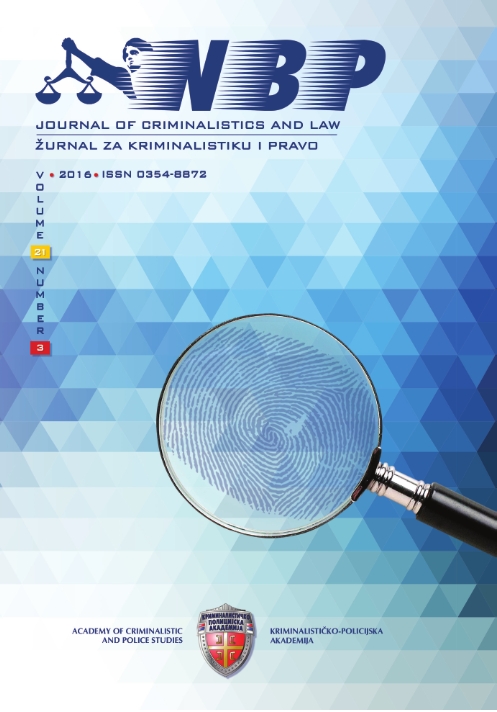Etička načela policijskog rada u zajednici sa maloletnim prestupnicima
Ethical Principles of Community Police Work with Juvenile Offenders
Author(s): Milan DelibašićSubject(s): Criminology
Published by: Kriminalističko-policijski univerzitet
Keywords: maloletničko prestupništvo; zaštita prava dece i maloletnika u kontaktu i/ili sukobu sa zakonom; policija; kodeks policijske etike; etičke dileme; etička načela
Summary/Abstract: The increase in the degree of violence is an obvious problem of our society, which will become urgent if radical changes are not undertaken and if strategic approaches are not taken for its solution. One segment of domestic violence is in educational institutions and it requires urgent development of content and taking concrete measures aimed at its prevention and suppression, because it produces concrete and long-term consequences with negative impact on the overall atmosphere in school environment and society as a whole. Any form of school violence can leave lasting effects on growing up, development and construction of children and youth, first of all on the mental health of young people, who are emotionally immature. Without an adequate response any violence is supported, encouraged and is taking root in new and more severe manifestations. In addition to this, brutal and cruel violent incidents in schools require greater interest and serious approach to their prevention and eradication by all stakeholders of school life, the factors of safety and responsible state and social institutions. Violence in schools should not be treated only at an individual or group level, and school level. This problem is not sufficiently seen as a process that takes place within the school, but it is necessary to consider the broader, social, and systemic framework, including the problems of its prevention and suppression. In this sense, violence in schools requires a systematic approach, with appropriate engagement and comprehensive forms of cooperation between all competent and responsible entities. The institutional entities in the prevention of delinquency are primarily the police and judiciary. In order to understand this issue, it is necessary to know police and judicial ethics. The causes of juvenile delinquency are numerous, and they are also subjective and objective. As it is evident that there are major differences between individuals of the same age, it could be said that juvenile delinquency is determined by the factors related to the personality as well as the factors of the social environment. Educational neglect is very important for the occurrence of juvenile delinquency. The cause of juvenile delinquency often lies in their own criminogenic family, or at the close acquaintance with which minors are identified because they have no better role model nearby. When it comes to the police officers who treat children in the Ministry of Internal Affairs of the Republic of Serbia it should know, above all, that the basis to avoid some of the ethical dilemmas from the general immaturity of a minor and his actions, in fact is to avoid double and multiple relationships with the child or minor or his parents or guardians. It has been said that the privacy of minors and the confidentiality of information today are imperative for every police officer who works with minors. Ethical dilemmas will be avoided and the child's right to choose and the freedom to make decisions will be respected. Of course, if this freely made decisions are not limited by law. Also, you should respect the right of a child, a minor, or his parent or guardian, (not) to consent to certain procedures, and at the same time, to encourage their participation, and gradually take responsibility upon themselves.
Journal: NBP – Nauka, bezbednost, policija
- Issue Year: 21/2016
- Issue No: 3
- Page Range: 149-168
- Page Count: 20
- Language: Serbian

